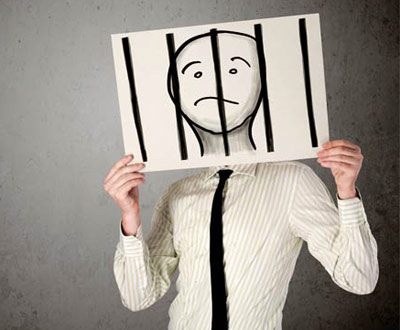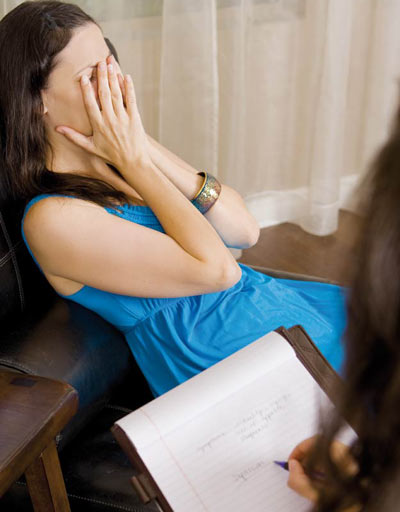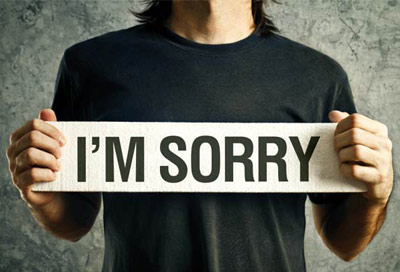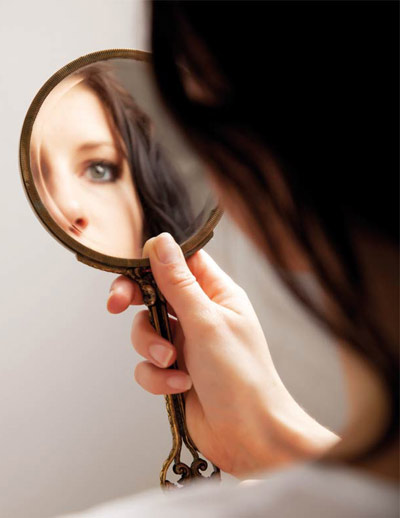Forgiveness is not about overlooking someone else’s mistakes, it is about letting go of your own judgement about them
—Anonymous
There is a lot of talk these days about self-care. One of the best ways I’ve ever taken care of myself wasn’t by receiving a massage, getting a pedicure or buying myself flowers. No, the best way I’ve taken care of myself was by forgiving the man who took my leg from me.
Most of us have a story about how we were wronged, cheated, abused, hurt, deceived, or betrayed. There are as many stories out there as there are relationships. The exact details of how my accident happened don’t matter. What matters is that I was hit by a car when I was 17 years old. My left leg was immediately amputated and my right leg, though severely injured, was saved. And what matters is that I held on to my bitter, angry feelings toward Harvey, the man who hit me, for 15 years and that the accumulation of these harboured feelings ended up limiting my life—emotionally, physically and spiritually. What matters is that once I forgave Harvey, I felt unburdened, empowered, and free.
When I have conversations with people about my forgiveness journey, I encounter both awe and resistance. Many people ask me how I did it and in their question I hear a yearning. Not always to forgive a past wrong doing, but to at least release their own pent-up resentments. I’d like to share some comments I often receive from people who want to forgive, but don’t know how. These comments are all familiar to me—I’ve said them to myself many times over the years. Here is how I turned these comments into questions and how I answered them for myself.
“What he did to me was so horrible, he doesn’t deserve forgiveness.”

During the 15 years after the accident, whenever I thought of Harvey, forgiveness was the furthest thing from my mind. Instead, I thought about hurting him. Or I felt sorry for him because he had to live with himself after what he did to me. He was reckless and stupid and uncaring. In all those years, he never contacted me to apologise.
Whenever I was restricted from participating in activities with my friends because of the limitations imposed by my leg, or whenever my prosthetic leg caused me pain, I silently cursed Harvey. Internally, I felt like the biggest victim on the planet. I felt like I was owed something—what, I didn’t know; by whom, I didn’t know. I knew my limitations were more than just physical and for so many years I felt trapped in a tangled web of resentment, anger, and the desire for revenge. A part of me wanted to free myself from this snare.
After 13 years of trying to stuff the sadness, anger, and bitter feelings I held toward Harvey, they morphed into something else: fear. My life was ruled by fear; I became afraid to drive because I was sure I would get in another accident. Every time I was on the freeway, I imagined that car—or that car—or that car—merging into my lane and hitting me. I imagined my car exploding in flames or flipped upside down or skidding into the guardrail. I saw myself trapped in my car or bleeding from all over my body or trying to escape. I had no control over what the other drivers would do or what would happen to me. It didn’t matter how careful I was, I could still get hurt again. Sometimes I would sob uncontrollably as I drove. I didn’t know what post-traumatic stress disorder was at the time, but it was overtaking my life.
It was shortly after this that I decided to go to therapy.

Sitting in my therapist’s office was like being in a cocoon of comfort. During one of my first visits, I was explaining to her how the accident happened. I had learned to talk about ‘this moment of my life’ with practised authority. I spoke with little emotion, since I became master at hiding my feelings.
As I was explaining why it took so long for the ambulance to arrive on the scene of the accident, a siren started wailing outside my therapist’s window. My voice cracked, but I continued my narrative. My therapist gently asked me to stop talking. “Listen to that siren, Colleen,” she said, as the siren howled louder. “How does that make you feel?”
Ever since the accident, the sound of an ambulance sent my heart racing, which made me feel foolish and weak, not strong like I had convinced myself I needed to be. Sitting there with my therapist in that warm room, I allowed myself to give in to the anguish. I couldn’t respond to her, I could only sob.
This is when I knew I needed help. This is when I knew I wasn’t living into the fullness of my potential. So the real question I had to ask myself was: Who would benefit if I released these feelings and forgave? Harvey may not have deserved my forgiveness, but I certainly deserved a chance at a happier future.
I knew my limitations were more than just physical and for so many years I felt trapped in a tangled web of resentment, anger, and the desire for revenge
“I’m waiting for forgiveness to happen.”

I attended a forgiveness workshop which included a short ritual. The facilitator asked us to write down a transgression that we wanted to forgive. I took a strip of paper and I wrote down, “I want to release my anger toward Harvey.” Then we stood in a circle around a small fire and individually tossed in our paper with the intention of releasing the burden. Once the ritual was complete, the facilitator did not give us any further instructions, just the intimation that we would feel better. Instead of feeling more peaceful after the ritual, I felt empty, hollow, and just as bitter. I hoped the ritual would take away my pain. I assumed that the desire to forgive, the desire to find peace in my heart would just happen if I wanted it.
I learned that forgiveness is more than a simple ritual—it takes work. The first step on my journey of forgiveness was to declare my intention to release the vengeful feelings, to stop being so angry, and to find acceptance and peace. To that end, I had to devote time and money for my therapy and put concentrated effort into letting go of 15 years of ingrained thought patterns. The ritual of burning the strip of paper was a positive, intentional way to declare my desire to change. But watching the paper burn did not, in any way, create a change in my heart. After the paper’s ashes had blown away, it was the daily struggle and conscious decision to release and forgive that gradually forged and revealed the path. Forgiveness for me was not a passive event; I made—and continued to make—the choice to actively forgive.
When I finally asked myself the question, Who do I want to be? I realised my resentment, anger and vengefulness didn’t make me happy. And I wanted to be happy. When I asked myself, What’s the pay-off to withholding forgiveness? I had to admit to myself that I was holding on to my need to be right at the expense of my happiness. It was time for a change.
In the end, I didn’t forgive Harvey for his sake, but for mine. I learned that forgiveness is something I did for myself, not for Harvey. Forgiveness was about the relationship between me and my soul.
Forgiveness for me was not a passive event; I made—and continued to make—the choice to actively forgive
“I’m afraid that if I feel my emotions they’ll overtake me.”
Whenever I stuffed my anger or hid my sadness, I would always imagine that I was sitting on a suitcase bulging with clothes, too many in fact, to close. That’s how big my feelings were. I knew what it felt like to feel happiness, joy and love. What I came to learn was that those emotions have just as much energy as sadness, resentment and hate. And, I would argue that love is even bigger and more powerful than hate. But I was so afraid of being consumed by my negative emotions that I spent lots of energy trying not to feel them. The more control I mustered to stuff my feelings, the more out of control I felt.
My therapist helped me unpack these tangled and rumpled emotions from this suitcase of denial. And when I asked her, “How do I deal with these emotions?”she gave me tools to express them appropriately. At first, I was overwhelmed by my anger and depleted by my sadness, but with her help I connected with them more consciously and deliberately. And yes, they were big, so big that I had to ask myself, “How do I get support through this process?” I reached out to my brother and ended up staying with him for a while to keep me accountable to my responsibilities—like getting up in the morning and going to work.
Feeling the emotions was scary, but it was the beginning of releasing myself from the prison of bitterness that I had put myself in.
So my second step on this journey was unpacking my emotions. I had to take them out and find the source behind them. Until I took control of these emotions, they had control over me.
The first step on my journey of forgiveness was to declare my intention to release the vengeful feelings, to stop being so angry, and to find acceptance and peace
“I’m so angry with him. I don’t want to see it from his side.”

Our visual cortex at the back of our brain is where we process visual information; it is how we perceive the world. I offer that our heart has a visual cortex too—a tool to help us perceive the world on an emotional level. Only, instead of accessing it with our two eyes, we access our heart’s visual cortex through one of two lenses: connection or separation. The quality of our experience is determined based on which lens we use to access our heart’s visual cortex.
In my late 20s I took a class in which we explored the book A Course in Miracles. I don’t recall the exact passage in the book, but one night in class something clicked, something about the concept that we are all part of the same energy, that we all come from the same stuff. As I pondered this notion, I took it a step further and realised that it meant that I was, in essence [a very pure essence] one with the homeless man on the street asking me for money, one with the clerk at the grocery store and though I didn’t want to admit, even one with Harvey.
Harvey had never contacted me to check if I was okay. I realised that, even though I had had my day in court with Harvey two years after the accident, he had never apologised or expressed any remorse. On the night of the 15th anniversary of the accident, a few months after I had started therapy, I was feeling depressed. With a vindictive heart, I decided I would call him and finally yell at him for ruining my life.
During our phone call that night, we talked briefly and, before I could berate him, we decided to meet each other in about a month’s time.
When we met, I was prepared to yell and scream at Harvey for what he had done to me. What I didn’t expect was that I would end up listening to him. I heard his story. I asked him to explain how the accident happened from his perspective and I heard how it had impacted his life. For years after the accident, he vacillated between nice guy and mean guy depending on whether he was reminded of the accident. His marriage didn’t survive his temperamental outbursts. He suffered from ulcers due to the stress. During those intervening 15 years, I had maintained a static image of Harvey—he was always that stupid, reckless, thoughtless 21 year old. I never thought of him as a growing, evolving being. What I saw 15 years later was a thoughtful, careful, polite man in his mid-30s.
And what I had secretly hoped for, I received: an apology.
I couldn’t have imagined that I would walk away from our four-hour encounter feeling connected to him and compassion for him. But that notion—that we are all connected—snuck back into my heart that day. I met two new people during the visit: Harvey and my compassionate self. After I returned home from our visit, I reflected on our conversation. I saw two possible paths: I could either continue blaming Harvey and being the victim—or I could choose to forgive. In order to hold anger, resentment and sometimes hate in my heart, I had to dehumanise Harvey. When I looked at the situation through the lens of connection, when I opened my heart and heard his story, I open myself to Harvey’s humanity. I chose forgiveness.
So the third step I took on the journey of forgiveness was to shift my perspective. I had to let go of my identity as a victim in order to forgive. I had to allow the story to change. How do I want to live this story? I wrote a new story for myself, the story where I don’t end up a victim because I lost my leg at the hands of an uncaring, insensitive bad guy, but I ended up a hero because I opened my heart to him.
I couldn’t have imagined that I would walk away from our four-hour encounter feeling connected to him and compassion for him
“But forgiveness needs to go both ways. And they aren’t even willing to talk to me.”

I was fortunate to have had the opportunity to meet with Harvey, hear his remorse, and receive his apology. I realise many folks don’t have the chance to have that open, caring dialogue. So what do you do then?
Learning to flex my forgiveness muscle has helped me respond to other wrong doings. There have been times in my life when I don’t have the opportunity to talk to the person who wronged me, but the single most important step I take is to try and see the situation from that person’s perspective. I’ve learned to ask the question, Why might this person have done that? Is it possible that this person didn’t mean to hurt me as much as he or she did? Sometimes I make up a story to help explain how they could have done that to me.
There are multiple studies about the physical and emotional benefits of forgiveness. On a physical level, once we forgive, we stop rehashing the wrong-doing over and over. As a result, we move out of the fight or flight mode of our reptilian brain, and our body relaxes. Our heart rate decreases, our blood pressure reduces and we stop taxing our stress hormones.
Earlier, whenever I drove past the site of the accident, my mouth used to flood with the metallic taste of shock, I broke out in a sweat, especially around the perimeter of my face and my hands became clammy. My breathing became shallow and it felt like there was a rock in my throat. Through therapy I learned what triggered these physical signs of stress.
Even though I have made peace with Harvey, I still get triggered, although now I have an understanding of what’s happening to my body. Now I know how to breathe through the stress. Now I know how to calm myself down.
On an emotional level, resentment and anger separates us, not just from our perpetrator, but from our loved ones as well. Because it’s not possible to be both hateful and loving.
After my accident, when my boyfriend and I took walks, I often spiralled out of control. The pain in my prosthetic leg triggered my anger. My anger triggered my resentment, which in turn triggered my desire for revenge. Without thinking, I would start yelling at my innocent boyfriend with the same intensity that I had fantasised using toward Harvey. Without wanting to, I was creating a divide between my boyfriend and myself.
After I forgave Harvey, my anger dissipated and my resentment dissolved. I stopped flying off the handle and hurting the people I loved.
Forgiveness is good for the spirit. Anger slams the door against the heart. When we open our hearts to love, there is no room for hate. Forgiveness is love‘s way in. The idea is to get our blood simmering with love, not boiling with anger.
My bitter feelings toward Harvey were at first intended to shield my heart from the pain of what happened to me. When I let them remain unresolved for 15 years, I allowed them to grow from a shield into a prison; I was locked in a heart that was hardened by resentment.
When I forgave Harvey, I accessed a compassionate part of myself that I hadn’t known before. I suddenly felt bigger than my anger—and more powerful. I felt freedom. My spirit felt expanded; I felt even more connected to everyone around me.
“I really want to forgive, but I can’t find the path.”
When I understood how holding onto my grudges kept me in the victim mentality, my grudges seemed less important. When I realised that I didn’t have to forgive Harvey, forgiveness became more of an option. Victims don’t have much control. Making the choice to forgive is how I reclaimed control of my emotions and control of my future.
I asked myself the question, How do I want to move forward with my life?
The answer was clear. Forgiveness was my way of taking care of myself—body, mind and spirit.

